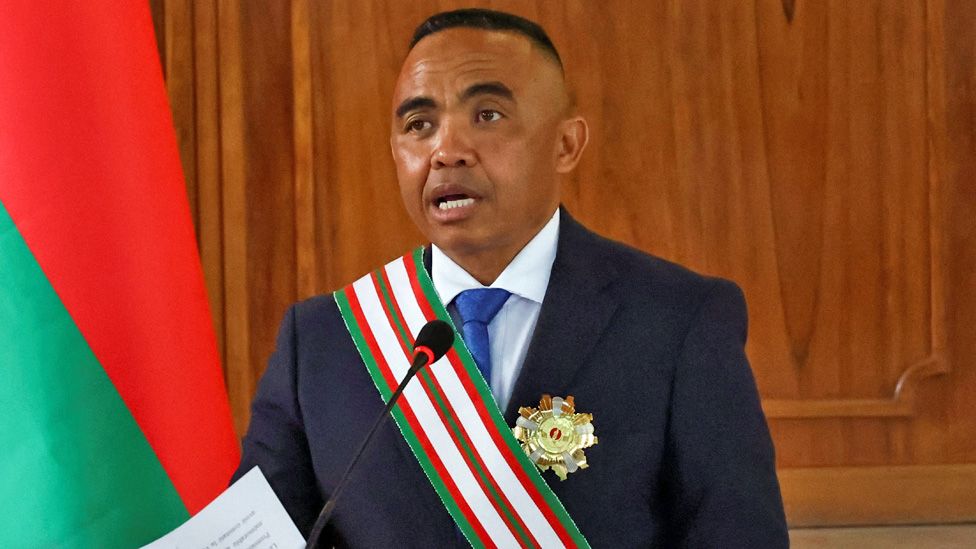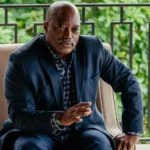Madagascar has entered a new political era as Colonel Michael Randrianirina was officially sworn in as president, days after a dramatic military takeover that ended weeks of public protests and forced President Andry Rajoelina to flee the country. The swearing-in ceremony, held at the Constitutional Court in Antananarivo, drew a massive crowd of citizens many of whom had participated in the youth-led demonstrations that demanded sweeping political and social change.
Col. Randrianirina, who appeared in a dark suit instead of his military fatigues, thanked the people of Madagascar, particularly the young protesters, for their courage and determination. “Today marks a historic turning point for our country,” he declared. “With a people in full fervour, driven by the desire for change, we joyfully open a new chapter in the life of our nation.” His remarks were met with applause from the gathered audience, symbolizing a renewed sense of hope across the nation after months of political uncertainty.
The new leader now faces the challenge of steering Madagascar through a sensitive transition period that is expected to be filled with political, legal, and economic obstacles. Despite these challenges, optimism is growing that Randrianirina’s leadership could usher in a new wave of stability and reform.
Constitutional Court President Florent Rakotoarisoa defended the legality of recent events, pushing back against international criticism that described the takeover as a coup. He argued that the situation did not violate the constitution but rather stemmed from its inadequacies, which allowed political tensions to spiral.
The protests that led to Rajoelina’s downfall began last month, largely organized by a youth movement known as Gen Z Mada. The demonstrators, angered by chronic power outages, water shortages, and poor governance, demanded transparency and accountability. When Rajoelina refused to step down despite weeks of unrest, tensions escalated until Col. Randrianirina, then head of the elite CAPSAT army unit, joined the protesters and announced that the military would take control to restore order and prepare for elections within two years.
Following his oath of office, the new president promised to dedicate all his energy to defending national unity and strengthening human rights. Trumpets blared as he took his pledge, marking the symbolic start of a new political chapter for Madagascar. Wearing the official sash and star of office, Randrianirina spoke with conviction about his priorities. “We will work hand in hand with all the driving forces of the nation to draft a fine constitution,” he said. “We are committed to breaking with the past. Our main mission is to thoroughly reform the country’s administrative, socio-economic, and political systems of governance.”
In his first address to the press after the ceremony, Col. Randrianirina outlined three immediate priorities for his government. His first focus will be an investigation into the state-owned water and electricity company, Jirama, which has long been plagued by mismanagement and corruption. “Today and tomorrow, we will examine what is happening at Jirama to prevent future difficulties,” he said, identifying it as a “first social priority.”
The second priority, he announced, is rice production—a critical issue for Madagascar’s largely agrarian population. “As we enter the agricultural season, we must assess how best to support our farmers,” he noted. The third immediate task, he said, would be appointing a prime minister and forming a new government capable of delivering on the people’s expectations.
Beyond domestic policy, Col. Randrianirina’s leadership could also signal a shift in Madagascar’s foreign relations. As a former French colony, Madagascar has historically maintained close ties with Paris, but recent events suggest a potential pivot toward Russia. On Thursday, Randrianirina met with Russian embassy officials to discuss deeper bilateral cooperation. During the protests, some demonstrators were even seen waving Russian flags, calling for Moscow’s involvement—a signal that Madagascar’s future alliances may look different under its new leadership.
As the country stands at a political crossroads, both local and international observers are watching closely. While concerns about the democratic process remain, there is also widespread hope that Randrianirina’s government will prioritize reform, transparency, and national unity. For the people of Madagascar, weary from years of economic hardship and political turbulence, the new president’s words offer a glimmer of renewal and a promise of transformation.












Leave a comment